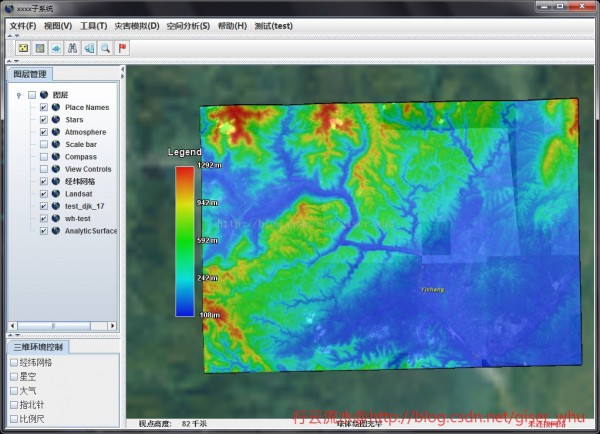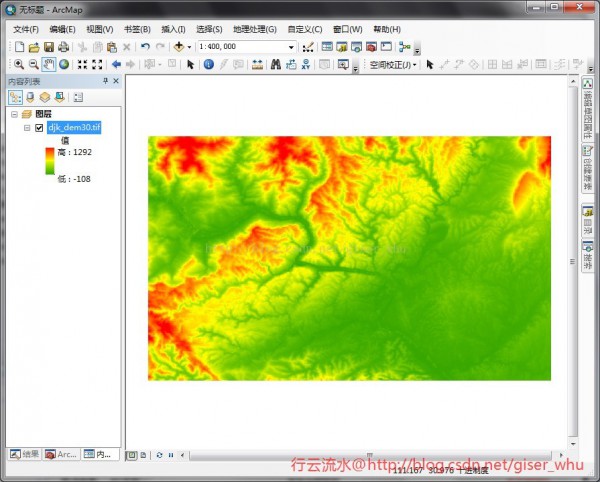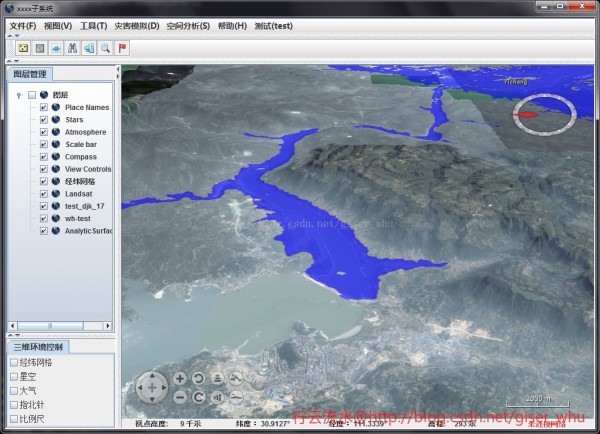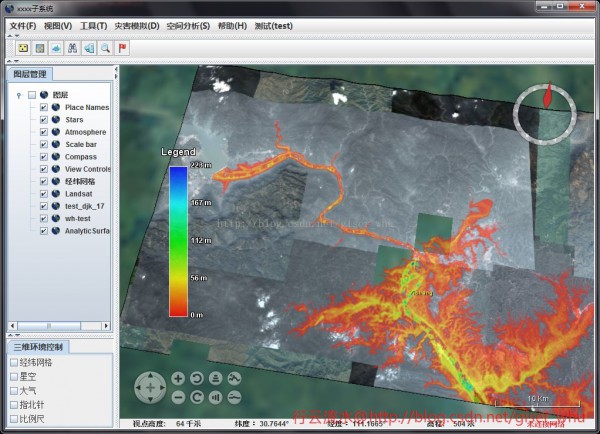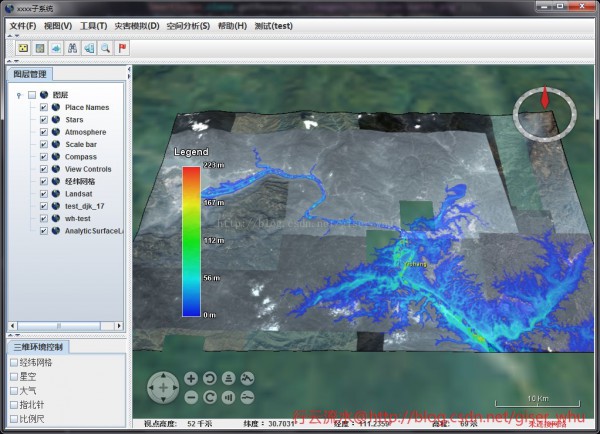World Wind Java开发之十――AnalyticSurface栅格渲染
来源:程序员人生 发布时间:2015-03-03 07:48:23 阅读次数:5071次
1、AnalyticSurfaceDemo
ArcGIS下对栅格的各种分级渲染效果是非常好的,可以做出很漂亮的图,现在在WW下也能够做出一样的效果了,看到这里是否是有点小兴奋呢。先看下WW自带的AnalyticSurfaceDemo的运行效果图:
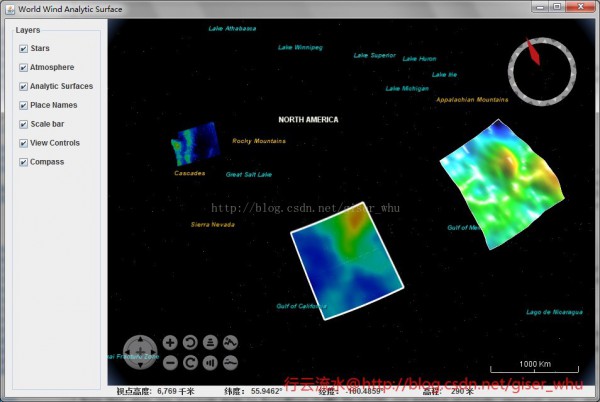
通过看源代码可以知道给出了3种渲染示例,其中两种是动态的,这里我需要的是对dem数据或是单波段影象的渲染,也就是左上方的渲染效果。
2、AnalyticSurface类
下面来看下主要用到的类:
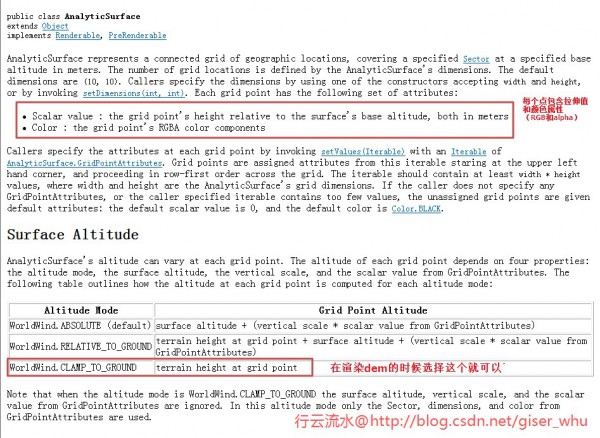
主要用到的方法:
// 创建AnalyticSurface并设置其属性
final AnalyticSurface surface = new AnalyticSurface();
surface.setSector(raster.getSector());
surface.setDimensions(raster.getWidth(), raster.getHeight());
surface.setValues(AnalyticSurface.createColorGradientValues(
raster.getBuffer(), raster.getTransparentValue(), extremes[0],
extremes[1], minHue, maxHue));
// surface.setVerticalScale(5e3);
// 设置表面渲染方式为 CLAMP_TO_GROUND
surface.setAltitudeMode(WorldWind.CLAMP_TO_GROUND);
根据自己的需要可以查阅开发文档设置其他属性。
3、DEM渲染实例
将demo中的代码略加修改封装为AnalyticSurfaceUtil类以供后面所有栅格数据的渲染使用,目前比较简单,后面陆续扩充该类。
WW下渲染效果:
ArcMap下渲染效果:
可以看到WW下渲染的效果丝绝不逊色,图是否是很漂亮呢。
4、洪涝摹拟渲染
这是对之前洪涝摹拟的改进,对洪涝摹拟输出的范围图和深度图进行渲染。
(1)范围图
(2)深度图
这幅渲染的深度图是否是有种火山喷发的感觉,很有艺术美感,非常喜欢这个渲染的效果。改1下配色再看下另外一种渲染效果:
5、源码。
下面是自己封装的AnalyticSurfaceUtil类,供大家参考:
/**
* @Copyright 2014⑵020 @刘硕
**/
package edu.whu.vge.util;
import gov.nasa.worldwind.WorldWind;
import gov.nasa.worldwind.avlist.AVKey;
import gov.nasa.worldwind.avlist.AVList;
import gov.nasa.worldwind.data.BufferWrapperRaster;
import gov.nasa.worldwind.data.DataRaster;
import gov.nasa.worldwind.data.DataRasterReader;
import gov.nasa.worldwind.data.DataRasterReaderFactory;
import gov.nasa.worldwind.exception.WWRuntimeException;
import gov.nasa.worldwind.geom.Extent;
import gov.nasa.worldwind.geom.Sector;
import gov.nasa.worldwind.layers.RenderableLayer;
import gov.nasa.worldwind.render.DrawContext;
import gov.nasa.worldwind.render.Renderable;
import gov.nasa.worldwind.util.Logging;
import gov.nasa.worldwind.util.WWBufferUtil;
import gov.nasa.worldwind.util.WWIO;
import gov.nasa.worldwind.util.WWMath;
import gov.nasa.worldwindx.examples.analytics.AnalyticSurface;
import gov.nasa.worldwindx.examples.analytics.AnalyticSurfaceAttributes;
import gov.nasa.worldwindx.examples.analytics.AnalyticSurfaceLegend;
import gov.nasa.worldwindx.examples.util.ExampleUtil;
import java.awt.Point;
import java.io.File;
import java.text.DecimalFormat;
import java.text.FieldPosition;
import java.text.Format;
import javax.swing.SwingUtilities;
/**
* @项目名称:SmartScope
* @类名称:AnalyticSurfaceUtil
* @类描写:
* @创建人:刘硕
* @创建时间:2015⑴⑵1 下午3:40:54
* @修改备注:
* @版本:
*/
public class AnalyticSurfaceUtil
{
/**
* 创建1个新的实例 AnalyticSurfaceUtil.
*
*/
public AnalyticSurfaceUtil()
{
// TODO Auto-generated constructor stub
}
public static void createPrecipitationSurface(double minHue, double maxHue,
final RenderableLayer outLayer)
{
String DATA_PATH = "J:/data/wwj/FloodDepth.tif";
BufferWrapperRaster raster = loadRasterElevations(DATA_PATH);
if (raster == null)
return;
// 获得像元最大值与最小值
double[] extremes = WWBufferUtil.computeExtremeValues(
raster.getBuffer(), raster.getTransparentValue());
if (extremes == null)
return;
// 创建AnalyticSurface并设置其属性
final AnalyticSurface surface = new AnalyticSurface();
surface.setSector(raster.getSector());
surface.setDimensions(raster.getWidth(), raster.getHeight());
surface.setValues(AnalyticSurface.createColorGradientValues(
raster.getBuffer(), raster.getTransparentValue(), extremes[0],
extremes[1], minHue, maxHue));
// surface.setVerticalScale(5e3);
// 设置表面渲染方式为 CLAMP_TO_GROUND
surface.setAltitudeMode(WorldWind.CLAMP_TO_GROUND);
AnalyticSurfaceAttributes attr = new AnalyticSurfaceAttributes();
attr.setDrawOutline(false);
attr.setDrawShadow(false);
attr.setInteriorOpacity(0.6);
surface.setSurfaceAttributes(attr);
// 设置图例样式
Format legendLabelFormat = new DecimalFormat("# m")
{
public StringBuffer format(double number, StringBuffer result,
FieldPosition fieldPosition)
{
double valueInFeet = number;
return super.format(valueInFeet, result, fieldPosition);
}
};
// 创建图例
final AnalyticSurfaceLegend legend = AnalyticSurfaceLegend.fromColorGradient(
extremes[0], extremes[1], minHue, maxHue,
AnalyticSurfaceLegend.createDefaultColorGradientLabels(
extremes[0], extremes[1], legendLabelFormat),
AnalyticSurfaceLegend.createDefaultTitle("Legend"));
legend.setOpacity(0.8);
legend.setScreenLocation(new Point(100, 300));
SwingUtilities.invokeLater(new Runnable()
{
public void run()
{
surface.setClientLayer(outLayer);
outLayer.addRenderable(surface);
outLayer.addRenderable(createLegendRenderable(surface, 600,
legend));
}
});
}
/**
*
* @方法名称: loadRasterElevations ;
* @方法描写: 读取数据(单波段) ;
* @参数 :@param path
* @参数 :@return
* @返回类型: BufferWrapperRaster ;
* @创建人:刘硕;
* @创建时间:2015⑴⑵2 上午11:25:40;
* @throws
*/
public static BufferWrapperRaster loadRasterElevations(String path)
{
// Download the data and save it in a temp file.
File file = ExampleUtil.saveResourceToTempFile(path,
"." + WWIO.getSuffix(path));
// Create a raster reader for the file type.
DataRasterReaderFactory readerFactory = (DataRasterReaderFactory) WorldWind.createConfigurationComponent(AVKey.DATA_RASTER_READER_FACTORY_CLASS_NAME);
DataRasterReader reader = readerFactory.findReaderFor(file, null);
try
{
// Before reading the raster, verify that the file contains
// elevations.
AVList metadata = reader.readMetadata(file, null);
if (metadata == null
|| !AVKey.ELEVATION.equals(metadata.getStringValue(AVKey.PIXEL_FORMAT)))
{
String msg = Logging.getMessage(
"ElevationModel.SourceNotElevations",
file.getAbsolutePath());
Logging.logger().severe(msg);
throw new IllegalArgumentException(msg);
}
// Read the file into the raster.
DataRaster[] rasters = reader.read(file, null);
if (rasters == null || rasters.length == 0)
{
String msg = Logging.getMessage(
"ElevationModel.CannotReadElevations",
file.getAbsolutePath());
Logging.logger().severe(msg);
throw new WWRuntimeException(msg);
}
// Determine the sector covered by the elevations. This
// information
// is in the GeoTIFF file or auxiliary
// files associated with the elevations file.
Sector sector = (Sector) rasters[0].getValue(AVKey.SECTOR);
if (sector == null)
{
String msg = Logging.getMessage("DataRaster.MissingMetadata",
AVKey.SECTOR);
Logging.logger().severe(msg);
throw new IllegalArgumentException(msg);
}
// Request a sub-raster that contains the whole file. This step
// is
// necessary because only sub-rasters
// are reprojected (if necessary); primary rasters are not.
int width = rasters[0].getWidth();
int height = rasters[0].getHeight();
DataRaster subRaster = rasters[0].getSubRaster(width, height,
sector, rasters[0]);
// Verify that the sub-raster can create a ByteBuffer, then
// create
// one.
if (!(subRaster instanceof BufferWrapperRaster))
{
String msg = Logging.getMessage(
"ElevationModel.CannotCreateElevationBuffer", path);
Logging.logger().severe(msg);
throw new WWRuntimeException(msg);
}
return (BufferWrapperRaster) subRaster;
}
catch (Exception e)
{
e.printStackTrace();
return null;
}
}
/**
*
* @方法名称: createLegendRenderable ;
* @方法描写: 创建图例 ;
* @参数 :@param surface
* @参数 :@param surfaceMinScreenSize
* @参数 :@param legend
* @参数 :@return
* @返回类型: Renderable ;
* @创建人:刘硕;
* @创建时间:2015⑴⑵2 上午11:26:07;
* @throws
*/
protected static Renderable createLegendRenderable(
final AnalyticSurface surface, final double surfaceMinScreenSize,
final AnalyticSurfaceLegend legend)
{
return new Renderable()
{
public void render(DrawContext dc)
{
Extent extent = surface.getExtent(dc);
if (!extent.intersects(dc.getView().getFrustumInModelCoordinates()))
return;
if (WWMath.computeSizeInWindowCoordinates(dc, extent) < surfaceMinScreenSize)
return;
legend.render(dc);
}
};
}
}
目前还很不完善,后面有需要的话打算做1个类似于ArcGIS的分级渲染工具,对降雨量蒸散发量等数据都可以很方便的进行渲染。
生活不易,码农辛苦
如果您觉得本网站对您的学习有所帮助,可以手机扫描二维码进行捐赠



